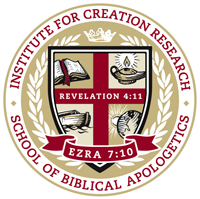Understanding Effective Biblical Apologetics
You are here
Home / Understanding Effectiv ...
In 1990, a graduate student from communist China--raised on atheistic evolution--asked me the following question: "Why should I believe in the Bible God, the Bible is true, and God is fair, when China was never given Bible truth about God to believe?" Simply put, this young man was asking: "Why should I believe in your Bible's God?" and "Why should I believe in your God's Bible?"
Noah Webster, in 1828, defined "apologetic" as "defending by words or arguments," tracing this English word back to the Greek apologemai. But what about biblical apologetics? How do Christians today reply logically, and with adequate evidence, to those who question God's revealed truth? Is the practice of apologetics limited to a "defense" of the truth? When is it proper for believers to take the initiative in communicating truth?
A more exact definition of biblical apologetics is: the science of learning, demonstrating, documenting, and communicating how believing God makes sense. It answers the fundamental question: "Why should I believe God?"
What can a proper study of apologetics accomplish for the teachable Christian?
Apologetics teaches that sufficient proof exists. God has provided objective truth, through general and special revelation, to prove He is both Creator and God. Apologists are often asked, "Can you show proof of God's existence?" But contrast that question with this one: "If you show proof of God's existence, will everyone who sees that proof be honest enough to approve of that proof of God's existence?" According to the Bible, the answer to 1 is "Yes," but the answer to 2 is "No." Why? The difference between those two answers is summarized by Paul's succinct phrase "without excuse," or anapologêtous in the Greek ("without a defense"), in Romans 1:19-20. Specifically, those who refuse to "approve" of God's revealed proofs are themselves "without excuse" for disapproving God's proof. Accordingly, apologetics must be realistic in balancing the presentation of proof with the predisposition of unpersuaded humans to suppress or reject that truth.
Apologetics teaches that those who reject truth have broken thinking. The challenge is even worse than just inexcusable skepticism because opposing creation's witness (that God is our Creator) triggers a built-in consequence: corruption of human powers to analyze truth, meaning, and moral value. God has "given over" unbelievers to a "reprobate mind" (Romans 1:28). This complicates matters for using rational apologetics: evidence and logic are not enough to "win" most unbelievers.
Paul's epistle to the Romans emphasizes this critical truth: all humans should be grateful to God for creating them, and thus should logically glorify Him as their Creator. However, humans are naturally predisposed to ignore, suppress, and even reject the solid proof they have about God's creatorship. Therefore, unless and until this inexcusable rejection of God is somehow remedied, humans automatically receive a terrible consequence called a "reprobate mind" (Romans 1:28). A "reprobate" mind malfunctions when it evaluates true vs. false, right vs. wrong, good vs. bad. So, how can apologetics help "defend" God's truth against such mental malfunctions?
Consider this question: What is the highest motive for the ministry of apologetics?
Apologetics is more about honoring God than winning an argument. Scripturally speaking, the main purpose of apologetics is not to "win a case" like a litigator, because the "jury" may be hopelessly corrupt or distracted. Rather, apologetics is primarily a science for honoring the Lord by carefully studying and then accurately communicating His revealed truth (biblical, scientific, historical, etc.), especially those truths that are questioned or opposed or misrepresented, ultimately trusting God to accomplish His good with the truths communicated (Isaiah 55:10-11; Psalm 19:1-14; Romans 10:14-18). In other words, let God handle the results.
Peter provides a well-known mission statement for every biblical apologist:
But sanctify the Lord God in your hearts: and be ready always to give an answer [or logical reply, Greek apologian] to every man that asketh you a reason [or logic, Greek logon] of the hope [or confidence, Greek elpidos] that is in you with meekness and fear. (1 Peter 3:15)
Notice that sanctifying God is the first priority; providing a ready reply is secondary and subsequent. This makes sense because our highest love and loyalty are supposed to be directed toward God; our obligation to serve our neighbor in love comes next (Matthew 22:39). Sanctifying God involves acknowledging Christ as Creator and rightfully preeminent (Colossians 1:16-18), so biblical apologetics must somehow always link back to Christ.
Apologetics means loving God first, people second. Therefore, apologetics is primarily a labor of love and loyalty to God, the Creator, and secondarily a labor of love and learning on behalf of humans, the creatures. Of course, real apologetics properly recognizes the authority of Scripture, as Christ did (compare John 14:6 with 17:17). Apologetics prioritizes all Scripture in general (2 Timothy 3:16) and Messianic prophecy in particular (1 Timothy 3:15; 1 Peter 1:10-12), because the salvation gospel itself is twice qualified by the phrase "according to the Scriptures" (1 Corinthians 15:3-4). These principles are critical, because the practice of inadequate apologetics flows from a reliance on inadequate principles.
Remember your audience. Apologetics, at the human level, must also "know its audience." Consider the following quote: "Wow! You look really old!" To a kindergartner, who is trying to act big, it's a compliment. Yet to the kindergartner's mother, who is thirty-something, it's no compliment! (Oops.) Audience matters. In apologetics, as in all communication, it is critical to answer the question: Who is my audience? Also, is the immediate audience the only audience? Apologetic communications, whether written or oral, can involve more than one audience. Actually, a Christian's entire life (after conversion) is an apologetic message, with God Himself as the primary audience. However, there is another audience, also unseen by mortal eyes: angels (1 Peter 1:12). Yet the audiences we most think about, when speaking or writing apologetically, are humans--believers, who need their faith strengthened, and unbelievers, who have other problems.
Use careful logic. Beware implied assumptions. "Which came first: the chicken or the egg?" Note that the question presupposes that God did not create the first hen with a fully formed ovary of eggs inside her. Beware false dichotomies (also called "either-or fallacies"). For example, "Answer 'yes' or 'no': have you stopped beating your wife?" Or, "Is a cardinal red, yes or no?" (Yes, if male; no, if female.)
Context counts. Remember the realtors' three secrets of success: location, location, location. This insight fits many arguments about Scripture: context matters! A failure to appreciate the context of Scripture routinely produces interpretive failure. Bank on it: unwarranted assumptions abound when critics try to criticize biblical texts. Scrutinize the actual words God provided (Acts 17:11; 2 Timothy 2:15). God purposefully gave the Bible to reveal truth to us.
Creation, rightly understood, glorifies God. God has providentially provided a huge inventory of general revelation: "the heavens declare the glory of God…." Examining, analyzing, and explaining this inventory of information is an ongoing endeavor that ICR has been undertaking for the past four decades. And some complicated questions justify multi-disciplinary study in biblical text interpretation, empirical science, forensic science, history, ancient linguistics, etc.
The truth is there, and it is enough--but what is it, and who will provide it to those with honest questions and misconceptions? Preparing and providing those reasonable replies is the task of biblical apologetics. In future articles on this topic, we will explain how reasonable replies are available and being provided.
And, yes, the grad student from China, raised in atheistic evolution, got his answer in 1990, and he promptly became a believer in Christ.
* Dr. Johnson is Associate Professor of Apologetics at the Institute for Creation Research.
Cite this article: Johnson, J. 2010. Understanding Effective Biblical Apologetics. Acts & Facts. 39 (4): 8-9.


